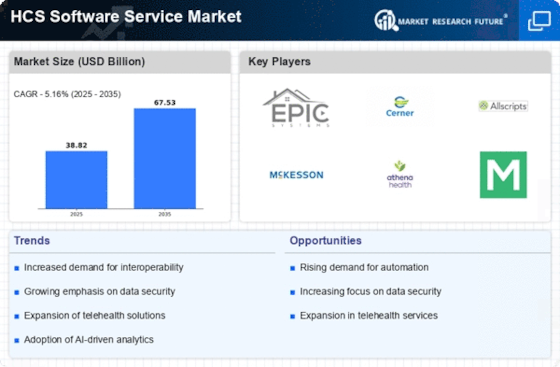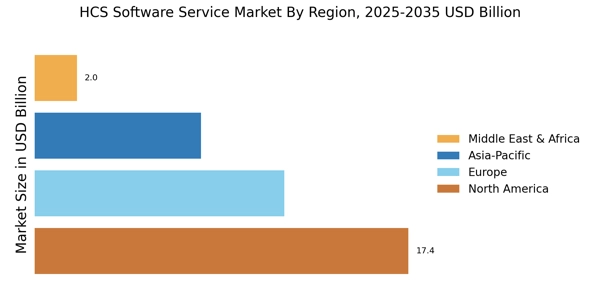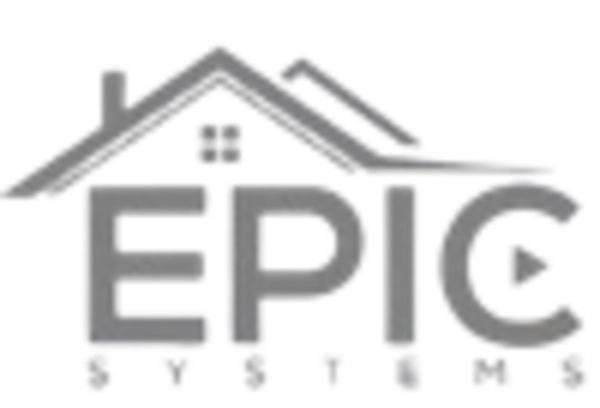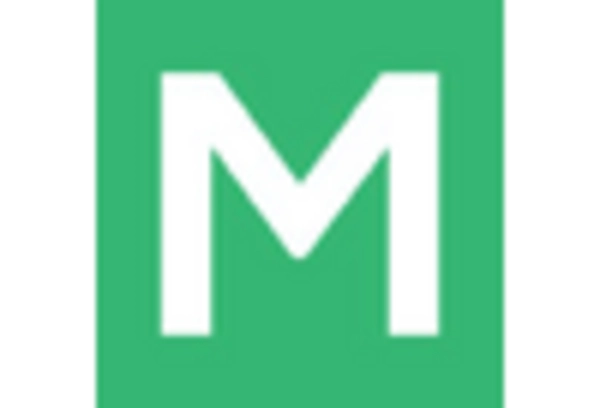Regulatory Compliance and Standards
The HCS Software Service Market is heavily influenced by the need for regulatory compliance and adherence to industry standards. As healthcare regulations become more stringent, organizations are compelled to invest in software solutions that ensure compliance with laws such as HIPAA and GDPR. This necessity creates a robust demand for HCS software services that can facilitate secure data management and reporting. The market for compliance-related software is projected to grow significantly, reflecting the increasing complexity of regulatory requirements. As healthcare providers strive to mitigate risks associated with non-compliance, the HCS Software Service Market is likely to see a rise in solutions that offer comprehensive compliance management features, thereby enhancing operational integrity.
Integration of Interoperable Systems
The HCS Software Service Market is witnessing a growing emphasis on the integration of interoperable systems. As healthcare organizations aim to improve care coordination and patient outcomes, the ability to share data seamlessly across different platforms is becoming paramount. The market for interoperability solutions is expected to expand, driven by the need for efficient data exchange among various healthcare stakeholders. This trend indicates that HCS software services must evolve to support interoperability standards, enabling healthcare providers to access and utilize patient information more effectively. Consequently, the demand for software solutions that facilitate interoperability is likely to increase, fostering a more connected healthcare ecosystem.
Advancements in Health Data Analytics
The HCS Software Service Market is significantly influenced by advancements in health data analytics. The ability to harness large volumes of health data for actionable insights is becoming increasingly critical for healthcare organizations. With the healthcare analytics market expected to grow to over 50 billion dollars by 2024, the demand for sophisticated software solutions that can analyze patient data, predict outcomes, and improve operational efficiency is on the rise. This trend suggests that organizations are prioritizing data-driven decision-making, which is likely to propel the development of innovative HCS software services that cater to these analytical needs. Consequently, the integration of advanced analytics into healthcare software is anticipated to enhance patient care and streamline administrative processes.
Shift Towards Value-Based Care Models
The HCS Software Service Market is increasingly shaped by the shift towards value-based care models. This transition emphasizes the quality of care over the volume of services provided, prompting healthcare organizations to adopt software solutions that support value-based initiatives. The market for value-based care technology is projected to grow substantially, as providers seek tools that enable performance measurement, patient engagement, and outcome tracking. This shift suggests that HCS software services must adapt to support the evolving needs of healthcare providers focused on delivering high-quality care while managing costs. As a result, the demand for innovative software solutions that align with value-based care principles is likely to rise.
Rising Demand for Telehealth Solutions
The HCS Software Service Market is experiencing a notable surge in demand for telehealth solutions. This trend is driven by the increasing need for remote healthcare services, which has been amplified by the growing acceptance of digital health technologies. According to recent data, the telehealth market is projected to reach a valuation of approximately 175 billion dollars by 2026. This growth is indicative of a broader shift towards virtual care models, which are becoming integral to healthcare delivery. As healthcare providers seek to enhance patient engagement and accessibility, the HCS Software Service Market is likely to see a corresponding increase in software solutions that facilitate telehealth services, including virtual consultations and remote patient monitoring.

















